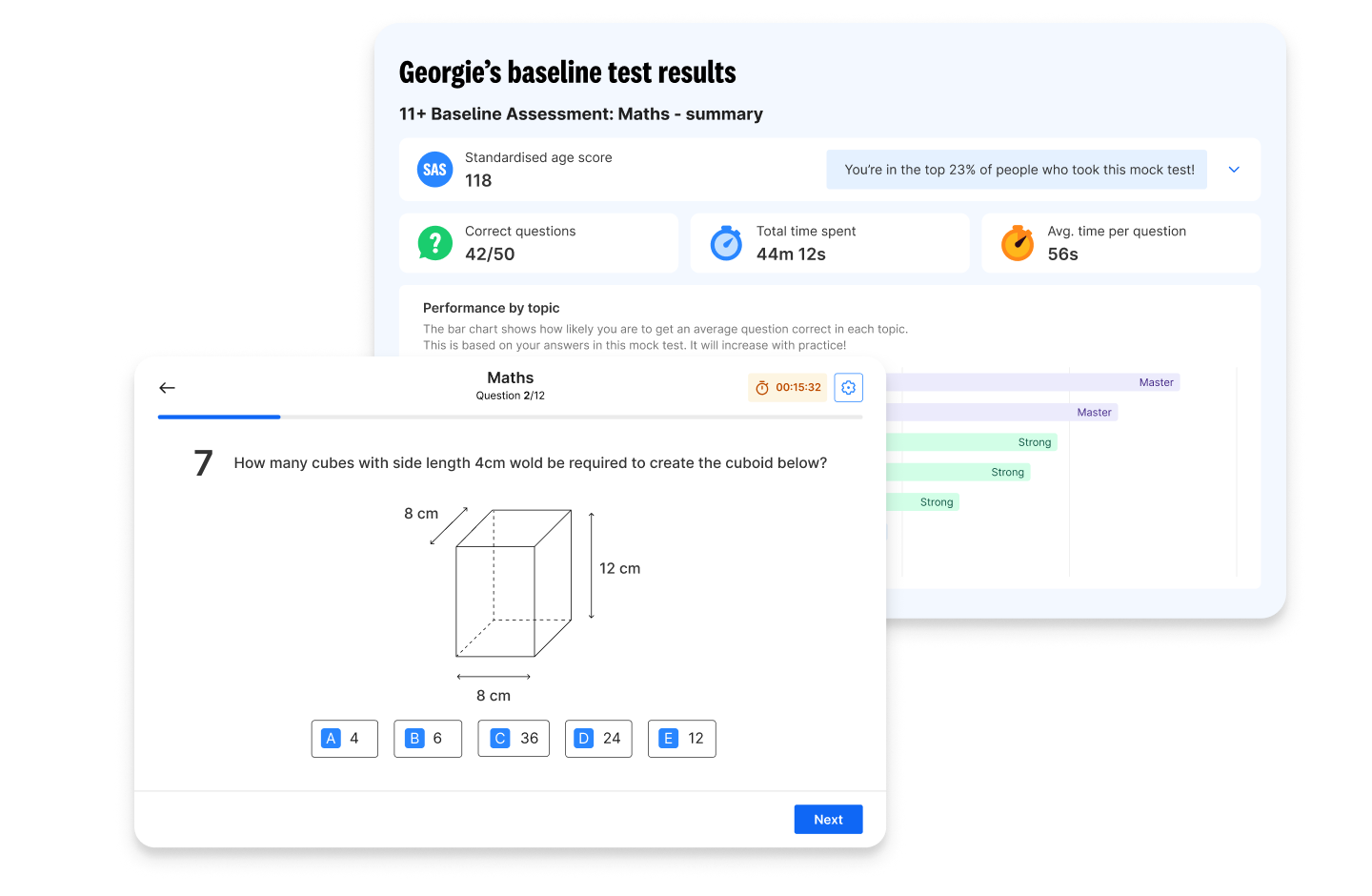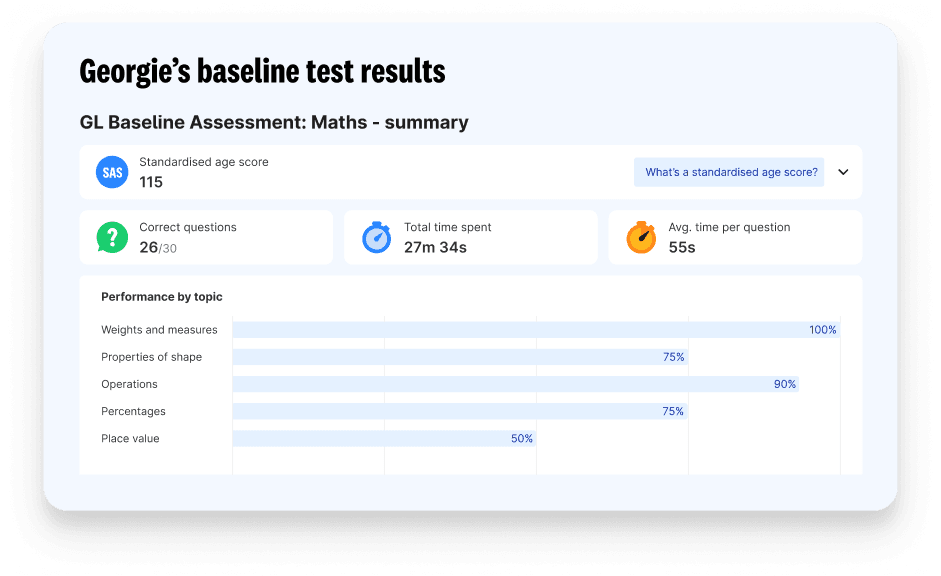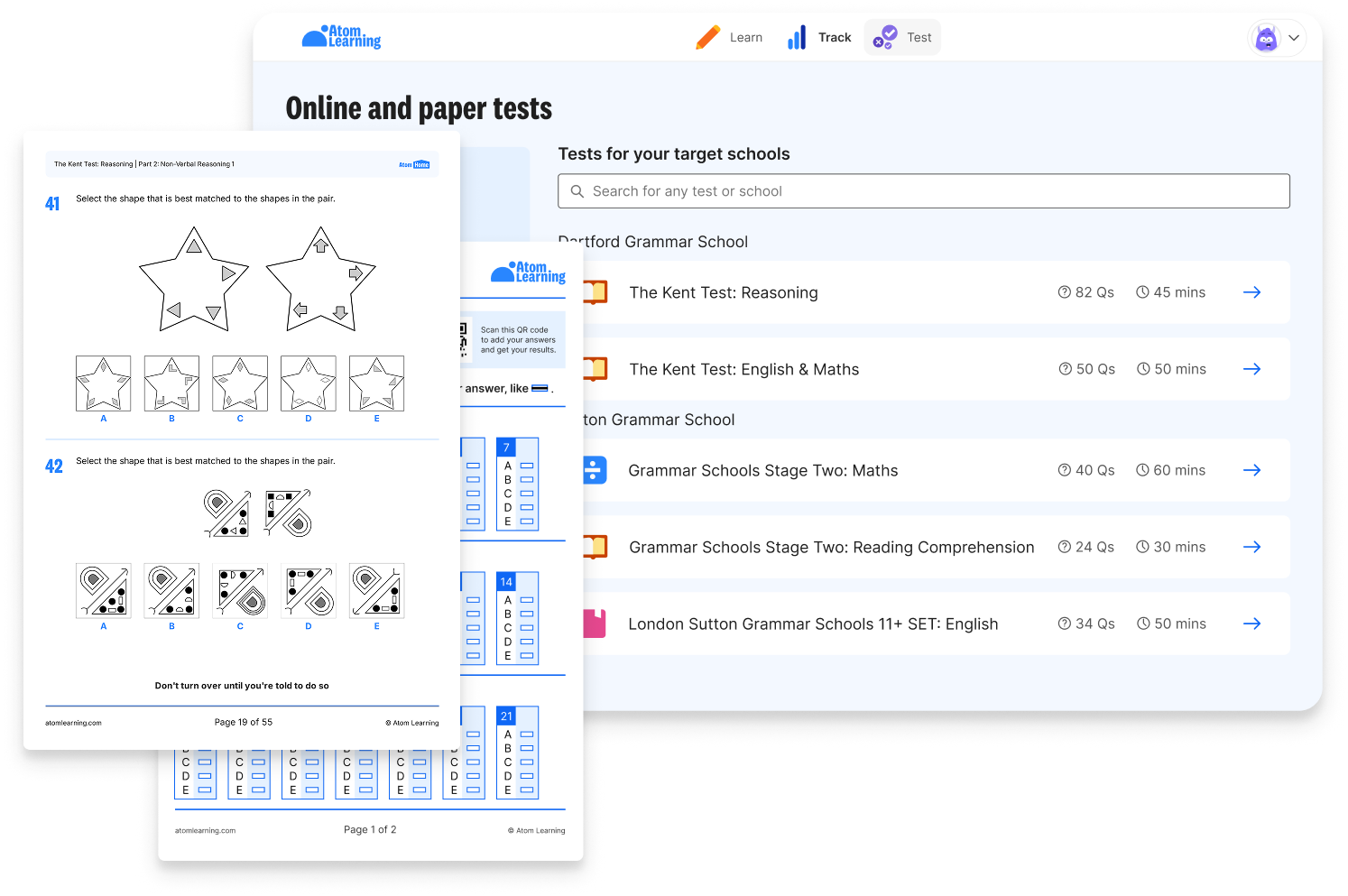11+ baseline tests: why they matter for 11+ success

Preparing for the 11+ exam can feel overwhelming for families. With so much content to cover, knowing where to start or how well your child is progressing isn’t always straightforward.
That’s where 11+ baseline tests come in. A baseline test helps you understand your child’s current ability in key exam subjects, giving you a clear starting point and valuable insights to guide their preparation.
In this article, we’ll explore:
- Why baseline tests are useful for 11+ preparation
- When to take a baseline test to maximise progress
- How to access Atom’s free baseline tests to support your child’s journey
What is an 11+ baseline test?
A baseline test is a short assessment designed to measure your child’s current performance in a specific subject. 11+ baseline tests are designed to test the types of skills and content assessed in 11+ exams. Unlike full-length mock exams, baseline tests provide a quick snapshot of knowledge, rather than testing exam technique or timing.
Baseline tests typically include questions from:
- English (comprehension, grammar, spelling and vocabulary)
- Maths (problem-solving, arithmetic and reasoning)
- Verbal reasoning (logic, word patterns and critical thinking)
- Non-verbal reasoning (shapes, patterns and spatial awareness)
Why are baseline tests useful?
✔ They help you decide if the 11+ is right for your child.
Not all children will thrive in a grammar school environment – and that’s okay! The 11+ is a competitive exam designed to select children working at the top of their year group.
If you're considering a grammar school for your child, a baseline test provides an early indication of whether they are currently working at the right level. It can also highlight areas where they might need extra support and practice to reach the required standard.
By taking a low-pressure assessment early on, you can make an informed decision about whether to move forward with 11+ preparation or explore alternative school options that better suit your child’s strengths and learning style.
✔ They show you where to focus 11+ preparation.
Effective 11+ preparation isn’t just about doing more work – it’s about focusing on the right work.
Without an initial benchmark, it can be difficult to know which subjects or topics to prioritise. Some children may already be strong in maths and verbal reasoning but need extra support in reading comprehension or non-verbal reasoning. Others may struggle with timed problem-solving but excel in core knowledge.
A baseline test pinpoints the exact areas your child needs to focus on, making preparation more efficient and structured. This means less time wasted on areas they’ve already mastered – and more time strengthening their weaker topics.
✔ They measure progress over time.
When preparing for the 11+, consistency is key. But how can you tell if your child’s efforts are paying off?
Taking a second baseline test later in the preparation process can help measure their improvement. It shows how much closer they are to being test-ready and highlights whether their study plan needs adjustments.
Regular testing can also help you make data-driven decisions about your child’s next steps. If your child’s scores are improving steadily, that’s a great sign they’re on track. If they’re struggling in certain areas, it’s an opportunity to refocus their revision strategy before the exam.
✔ They reduce stress and build confidence.
For many children, the 11+ can feel overwhelming. With so much to learn, it’s easy to lose confidence or feel like they’re not making progress.
Baseline tests break preparation into manageable steps, helping children see their own improvement over time. Every small win – a higher score, fewer mistakes, or a better understanding of a topic – boosts their motivation and self-belief.
By removing uncertainty, baseline tests help children feel more in control of their learning. And when children feel confident, they perform better – both in practice and on exam day.
Is your child ready for the 11+?
See where they stand in minutes. Atom’s free 11+ baseline tests give you an instant breakdown of their strengths and gaps. Know exactly what to focus on next and start preparing with direction, not uncertainty.

How Atom’s 11+ baseline tests can help – for free!
Many 11+ exam prep providers charge for baseline tests or require a paid subscription to access assessments. At Atom Learning, we believe every family should have access to high-quality 11+ preparation – which is why our baseline tests are completely free.
What do you get with Atom’s free baseline tests?
- Covers all key subjects: English, maths, verbal & non-verbal reasoning
- Instant results: See exactly where your child stands
- Standardised age score: see how your child compares to others of the same age, with the same type of score used in real 11+ exams
- Breakdown by topic: Understand strengths and areas to improve
With no payment or commitment required, Atom’s baseline tests give you the most accurate starting point for your child’s 11+ preparation.
Take a free 11+ baseline test now and get a clear picture of your child’s 11+ readiness!
What happens after the test?

Once your child has taken a baseline test, you’ll receive an email with a detailed breakdown of their performance. This insight helps you:
- Plan their revision effectively
- Fill in knowledge gaps with targeted practice
- Track progress with additional practice tests
For ongoing support, Atom Home offers adaptive learning, unlimited practice questions, and full-length mock tests to help your child feel confident on exam day.
Take the guesswork out of 11+ preparation. Start with a free baseline test today!
How to use baseline tests and mock tests together
1. Start with a baseline test
- Take an initial baseline test at the beginning of 11+ preparation to assess your child’s starting point.
- Use the results to identify strengths and weaknesses and tailor their study plan.
2. Build knowledge and skills
- Focus practice on weaker areas using targeted 11+ learning and exam-style questions.
- Encourage a balanced approach across all subjects to ensure well-rounded preparation.
3. Take mock tests to develop exam technique
- Once your child has built confidence in key subjects, introduce full-length mock tests.
- Mock exams simulate real test conditions, helping your child practise timing, stamina, and working under pressure.
- Compare mock exam results with baseline test scores to measure overall progress.
4. Continue with regular mock exams to refine performance
- In the final months before the exam, focus on taking and reviewing mock exams rather than baseline tests.
- Use mock tests to fine-tune exam technique, helping your child manage timing, accuracy, and working under pressure.
- After each mock exam, review mistakes and adjust revision to address weaker areas.
By combining baseline tests for knowledge assessment early on with mock exams for exam practice, you’ll help your child feel fully prepared and confident for the 11+.
Take control of your child’s 11+ preparation.

Not sure if your child is on track for the grammar school 11+? You don’t need to guess what to cover or whether they’re ready. Atom shows you exactly what to practise each week and how they’re performing, so you can stay ahead of the process without the stress.
- Follow personalised weekly exam plans that show them what to learn next.
- Download replica 11+ practice papers and upload a photo for instant, stress-free marking.
- Track progress and see how they compare to others applying to the same schools.
Start your free trial and help your child feel fully prepared for the 11+.

.avif)
